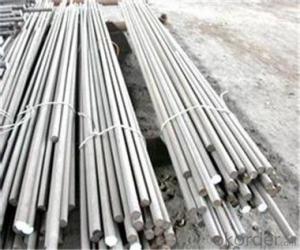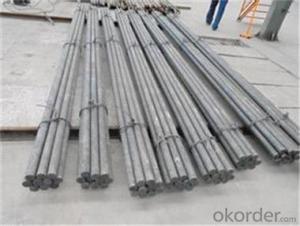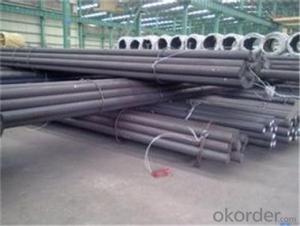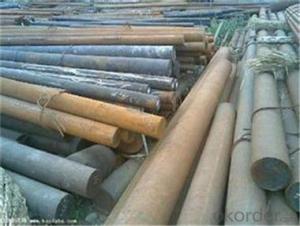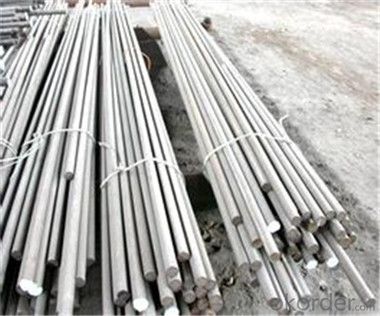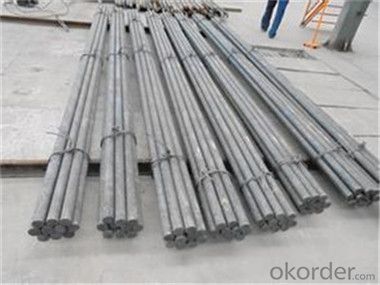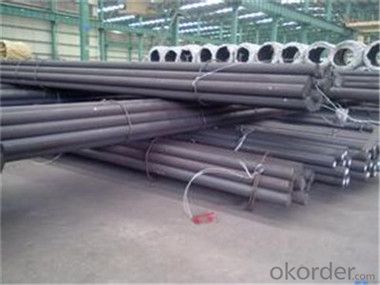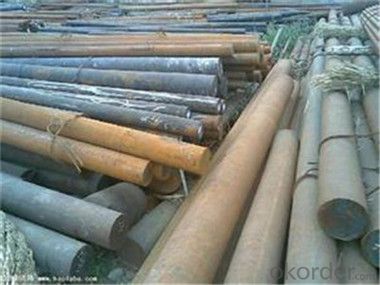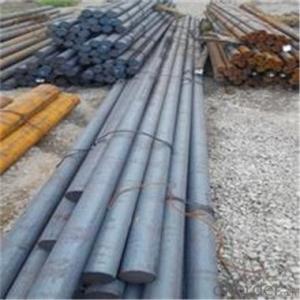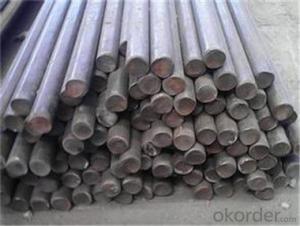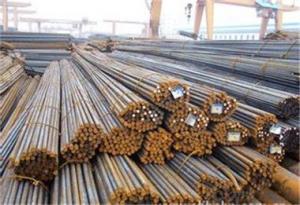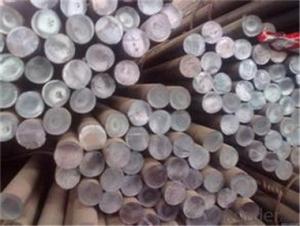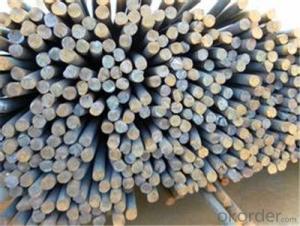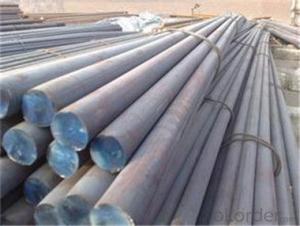Round Bar Reliable Manufacturer with Standard High Quality
- Loading Port:
- Tianjin
- Payment Terms:
- TT OR LC
- Min Order Qty:
- 77 m.t.
- Supply Capability:
- 2000000 m.t./month
OKorder Service Pledge
OKorder Financial Service
You Might Also Like
Description of steel round bar:
Process:Hot rolled,cold drawn,forged,wrought
Festures of steel round bar:
Inspection: 100% UT test, mill test certificate, third party inspection such as SGS,BV etc.
Packing: In bundle, tied by steel straps, covered with protecting film. Use wooden box.
Specifications of steel round bar:
Description | steel round bar | |
Material | ASTM /AISI | 1005,1006,1008,1010,1015,1020,1025,1030,1035, 1040,1045,1050,1055,1060,1065,1070,1080,1084 |
DIN | Ck10,Ck15,Ck22,Ck25,Ck30,Ck35,Ck40,Ck45,Ck50, 30Mn4,40Mn4,1.7225,1.7220,1.7218,1.7016,1.6523 | |
Standard | GB/T799,ASTM A29,A36,A108,A321,A575,BS970,DIN1652,JIS G4051 | |
cross section | Round Other shape:square,hexagonal,flat,angle,rectangular | |
Surface | Black, galvanized,grinded,varnished,bare | |
Specifications | Round bar | Diameter: 12mm~650mm |
Angle bar | Size: 3mm*20mm*20mm~12mm*800mm*800mm | |
Square/ bar | Size: 4mm*4mm~100mm*100mm | |
Flat bar | Thickness: 2mm~100mm | |
Width:10mm~500mm | ||
Hexagonal | Size: 4mm~800mm | |
Length | Standard 6m,9m,12m or as required. | |
Trade terms | Payment terms | T/T,L/C,Western Union,negotiable etc. |
Price terms | FOB,CIF,CFR,EXW etc. | |
Applications | Steel round bar is widely used for all general fabrication and repairs in industrial maintenance, agricultural implements, transportation equipment, ornamental work frame work, braces, supports, shafts,axels,etc. Hot rolled Steel round bars have a slightly grain textured finish. | |
Images of steel round bar:
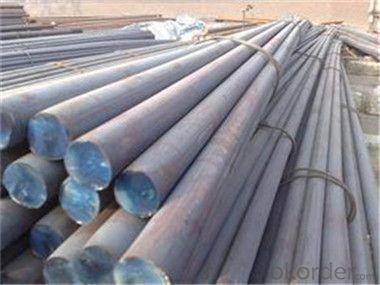
FAQ:
1. What is your package?
Packing situation: standard seaworthy packing or as customer required.
2. How long is the lead time?
Delivery time: 45 days after order confirmed.
3. What payment term do you accept?
Payment: T/T or L/C at sight.
- Q: Can steel round bars be bent or formed into different shapes?
- Steel round bars have the capability to undergo bending or shaping into diverse forms. Steel possesses a remarkably malleable nature, signifying that it can be easily molded sans any fracturing or cracking. To achieve the bending or shaping of steel round bars, multiple techniques can be employed, including the application of heat to enhance pliability or the utilization of specialized tools like hydraulic benders or presses. The extent to which steel round bars can be bent or shaped is contingent upon factors such as steel thickness, composition, and the desired specific form or angle. In a broader sense, steel round bars provide a versatile choice for fabricating a wide array of shapes and structures that are indispensable in various industries, encompassing construction, automotive, and manufacturing.
- Q: What are the properties of steel round bars?
- Steel round bars have several properties that make them highly desirable for a wide range of applications. Firstly, they possess exceptional strength and durability, making them suitable for load-bearing structures and heavy-duty machinery. Additionally, steel round bars exhibit excellent corrosion resistance, allowing them to withstand harsh environmental conditions without compromising their integrity. They also have a high melting point and can withstand extreme temperatures, making them ideal for applications that involve heat or fire. Furthermore, steel round bars can be easily machined, welded, and fabricated, providing flexibility in design and construction processes. Lastly, they offer good dimensional stability and precise tolerances, ensuring consistent performance and reliability in various industrial and construction settings.
- Q: How do you prevent steel round bars from rusting during storage?
- In order to prevent rusting of steel round bars during storage, various measures can be taken: 1. Ensure the round bars are stored in a dry environment: Moisture is a major factor in causing rust. It is important to have a dry storage area that is free from leaks or humidity. Consider using dehumidifiers or moisture-absorbing products to maintain dryness. 2. Apply a rust inhibitor: Coating the steel round bars with a rust inhibitor creates a protective layer that prevents rust formation by blocking moisture and oxygen. Rust inhibitors are available in different forms, such as sprays, oils, or waxes. Follow the manufacturer's instructions when applying the inhibitor. 3. Store the round bars in a climate-controlled area: Fluctuations in temperature can result in condensation, which can lead to rust formation. Storing the round bars in a climate-controlled area with a consistent temperature helps minimize the risk of rusting. 4. Package the round bars properly: Use suitable packaging materials to prevent direct contact between the steel round bars and moisture or other contaminants. Consider wrapping them in plastic or using packaging materials that are resistant to moisture. 5. Regularly inspect and maintain: Periodically check the stored round bars for any signs of rust or damage. If any rust spots are found, clean them promptly and reapply a rust inhibitor to prevent further corrosion. Remember, prevention is crucial in avoiding rust on steel round bars during storage. By implementing these measures, you can greatly reduce the risk of rust formation and maintain the quality of the round bars.
- Q: How are steel round bars used in the manufacturing of hydraulic cylinders?
- Steel round bars are a crucial component in the manufacturing of hydraulic cylinders due to their strength, durability, and versatility. These round bars are typically made from carbon steel, alloy steel, or stainless steel, which are all known for their high tensile strength and resistance to corrosion. The first step in using steel round bars for hydraulic cylinders is the selection of the appropriate diameter and length. The diameter of the round bar determines the overall strength of the hydraulic cylinder, and the length determines its size and capacity. Once the desired dimensions are determined, the steel round bars are cut to the required length using specialized cutting tools. Next, the steel round bars undergo a series of processes to shape them into the necessary components of a hydraulic cylinder. This includes machining, drilling, and turning operations to create features such as threaded ends, grooves, and mounting surfaces. These processes are carried out with precision to ensure the round bars meet the exact specifications of the hydraulic cylinder design. After the shaping processes, the steel round bars are heat-treated to enhance their mechanical properties. Heat treatment involves heating the round bars to a specific temperature and then rapidly cooling them to achieve the desired hardness, toughness, and dimensional stability. This step is crucial in ensuring the hydraulic cylinders can withstand the high pressures and forces they will encounter during operation. Once the steel round bars have been shaped and heat-treated, they are further processed to achieve the desired surface finish. This can involve processes such as grinding, polishing, or coating to improve the round bars' appearance and resistance to corrosion. The surface finish is important for ensuring smooth operation and preventing any potential leaks or damage to the hydraulic cylinder. Finally, the steel round bars are assembled with other components such as piston rods, cylinder heads, and seals to complete the hydraulic cylinder. These assemblies are carried out using advanced welding or fastening techniques to ensure the components are securely attached and can withstand the forces and pressures exerted during hydraulic operation. In summary, steel round bars play a vital role in the manufacturing of hydraulic cylinders by providing the necessary strength, durability, and versatility required for these critical components. From the initial selection of the appropriate diameter and length to the shaping, heat treatment, and assembly processes, the use of steel round bars ensures the hydraulic cylinders can effectively transmit hydraulic power while withstanding the demanding conditions they are designed for.
- Q: How are steel round bars used in the construction of airports and runways?
- Steel round bars are commonly used in the construction of airports and runways for various purposes. They are primarily used to reinforce the concrete structures, such as the foundation, columns, beams, and slabs. The round bars provide strength and durability to the concrete, ensuring that it can withstand heavy loads and resist cracking or collapsing. Additionally, steel round bars are also used in the construction of drainage systems, fencing, and other infrastructure components within airports and runways.
- Q: What are the different cutting methods used for steel round bars?
- There are several cutting methods commonly used for steel round bars, including abrasive cutting, cold saw cutting, band saw cutting, and plasma cutting. Each method has its own advantages and suitability depending on factors such as the required precision, speed, and cost-effectiveness of the cutting process.
- Q: Can steel round bars be used for pump shaft applications?
- Yes, steel round bars can be used for pump shaft applications. Steel round bars are commonly used for pump shafts due to their excellent strength, durability, and resistance to corrosion. Pump shafts are subjected to high torsional loads and need to withstand the stresses of rotating machinery. Steel round bars offer the necessary mechanical properties to handle these conditions, making them a suitable choice for pump shaft applications. Additionally, the versatility of steel allows for various heat treatments and surface finishes to further enhance its performance and longevity in pump shafts.
- Q: Can steel round bars be used for making axles?
- Yes, steel round bars can be used for making axles. Steel is a strong and durable material that is commonly used for axles due to its high tensile strength and ability to withstand heavy loads and stress. Round bars provide a suitable shape for axles as they offer good structural integrity and can be easily machined and manipulated to meet specific axle requirements.
- Q: What are the advantages of using chromium-alloy steel round bars?
- There are several advantages to using chromium-alloy steel round bars. Firstly, chromium-alloy steel round bars have excellent corrosion resistance properties. The addition of chromium to the steel increases its ability to withstand corrosion and oxidation, making it suitable for use in harsh environments or applications where exposure to moisture or chemicals is a concern. This corrosion resistance helps to prolong the lifespan of the round bars, reducing maintenance and replacement costs. Secondly, chromium-alloy steel round bars offer high strength and durability. The alloying of chromium with steel enhances its mechanical properties, such as tensile strength, hardness, and toughness. This makes chromium-alloy steel round bars ideal for applications that require high strength and resistance to wear and tear, such as construction, heavy machinery, and automotive industries. Another advantage of using chromium-alloy steel round bars is their heat resistance. The addition of chromium improves the heat resistance of the steel, allowing it to maintain its strength and structural integrity even at elevated temperatures. This makes it suitable for use in high-temperature applications, such as furnace components, boilers, and heat exchangers. Furthermore, chromium-alloy steel round bars are known for their excellent machinability. The alloying elements in the steel enhance its ability to be easily machined, allowing for precise shaping and finishing. This makes it easier and more cost-effective to manufacture complex components or parts using chromium-alloy steel round bars. Lastly, chromium-alloy steel round bars are readily available in the market. Due to their popularity and wide range of applications, chromium-alloy steel round bars can be easily sourced from various suppliers. This availability ensures a consistent supply of the material, reducing production downtime and lead times. Overall, the advantages of using chromium-alloy steel round bars include corrosion resistance, high strength and durability, heat resistance, excellent machinability, and availability. These properties make chromium-alloy steel round bars a versatile and reliable choice for a wide range of applications in various industries.
- Q: What are the different types of steel round bars used in the manufacturing of cutting tools?
- There are several types of steel round bars commonly used in the manufacturing of cutting tools. Some of the most common types include high-speed steel (HSS), tool steel, carbon steel, and stainless steel. Each type has its own unique properties and characteristics that make it suitable for specific cutting applications. For example, HSS is known for its high hardness, toughness, and heat resistance, making it ideal for high-speed cutting operations. Tool steel, on the other hand, is known for its exceptional wear resistance and ability to retain sharp edges, making it suitable for cutting tools that require long-lasting performance. Carbon steel is often used for general-purpose cutting tools due to its affordability and good balance of hardness and toughness. Lastly, stainless steel is chosen for cutting tools that require excellent corrosion resistance, making it suitable for applications in harsh environments or when working with corrosive materials.
Send your message to us
Round Bar Reliable Manufacturer with Standard High Quality
- Loading Port:
- Tianjin
- Payment Terms:
- TT OR LC
- Min Order Qty:
- 77 m.t.
- Supply Capability:
- 2000000 m.t./month
OKorder Service Pledge
OKorder Financial Service
Similar products
Hot products
Hot Searches
Related keywords
